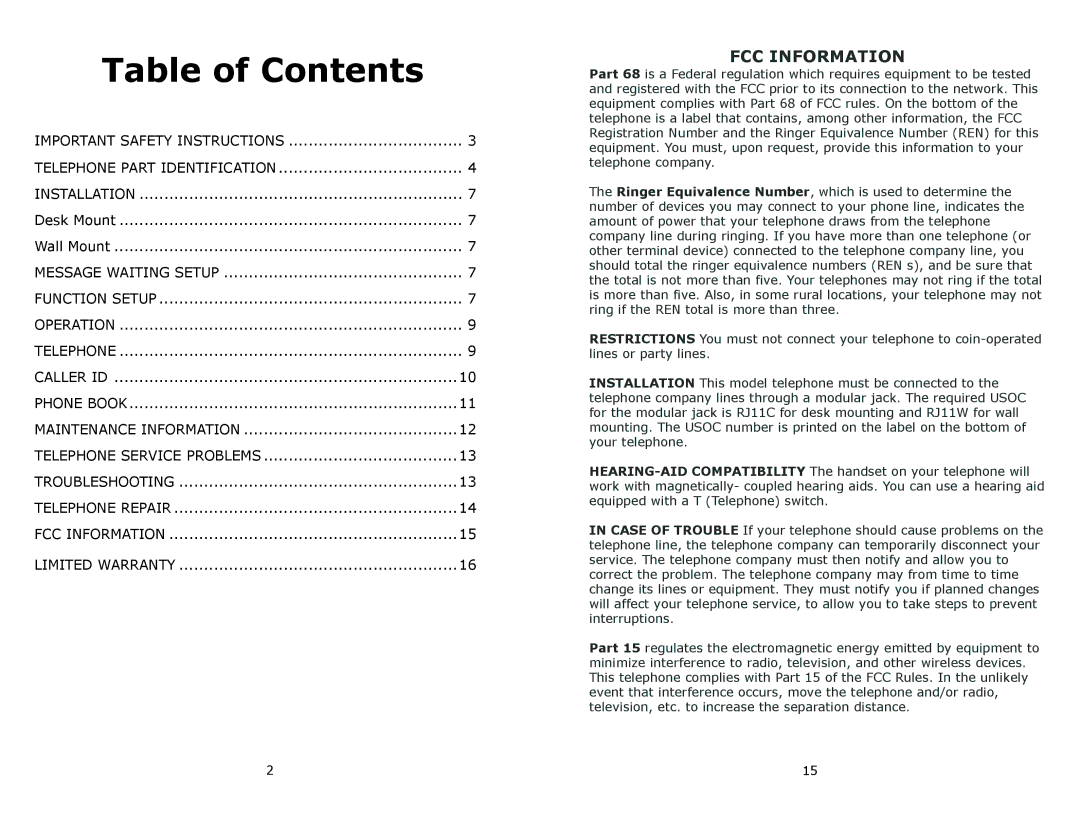Table of Contents |
|
IMPORTANT SAFETY INSTRUCTIONS | 3 |
TELEPHONE PART IDENTIFICATION | 4 |
INSTALLATION | 7 |
Desk Mount | 7 |
Wall Mount | 7 |
MESSAGE WAITING SETUP | 7 |
FUNCTION SETUP | 7 |
OPERATION | 9 |
TELEPHONE | 9 |
CALLER ID | 10 |
PHONE BOOK | 11 |
MAINTENANCE INFORMATION | 12 |
TELEPHONE SERVICE PROBLEMS | 13 |
TROUBLESHOOTING | 13 |
TELEPHONE REPAIR | 14 |
FCC INFORMATION | 15 |
LIMITED WARRANTY | 16 |
FCC INFORMATION
Part 68 is a Federal regulation which requires equipment to be tested and registered with the FCC prior to its connection to the network. This equipment complies with Part 68 of FCC rules. On the bottom of the telephone is a label that contains, among other information, the FCC Registration Number and the Ringer Equivalence Number (REN) for this equipment. You must, upon request, provide this information to your telephone company.
The Ringer Equivalence Number, which is used to determine the number of devices you may connect to your phone line, indicates the amount of power that your telephone draws from the telephone company line during ringing. If you have more than one telephone (or other terminal device) connected to the telephone company line, you should total the ringer equivalence numbers (REN s), and be sure that the total is not more than five. Your telephones may not ring if the total is more than five. Also, in some rural locations, your telephone may not ring if the REN total is more than three.
RESTRICTIONS You must not connect your telephone to
INSTALLATION This model telephone must be connected to the telephone company lines through a modular jack. The required USOC for the modular jack is RJ11C for desk mounting and RJ11W for wall mounting. The USOC number is printed on the label on the bottom of your telephone.
IN CASE OF TROUBLE If your telephone should cause problems on the telephone line, the telephone company can temporarily disconnect your service. The telephone company must then notify and allow you to correct the problem. The telephone company may from time to time change its lines or equipment. They must notify you if planned changes will affect your telephone service, to allow you to take steps to prevent interruptions.
Part 15 regulates the electromagnetic energy emitted by equipment to minimize interference to radio, television, and other wireless devices. This telephone complies with Part 15 of the FCC Rules. In the unlikely event that interference occurs, move the telephone and/or radio, television, etc. to increase the separation distance.
2 | 15 |
